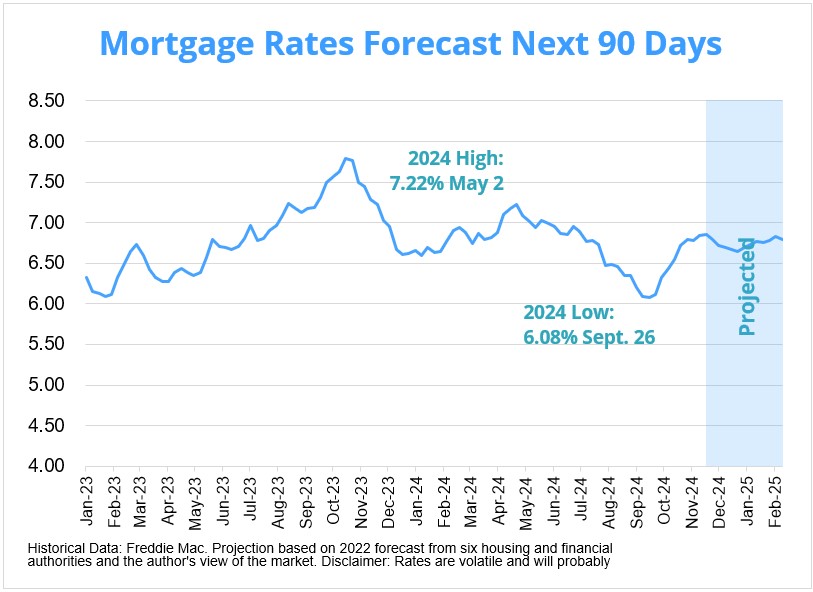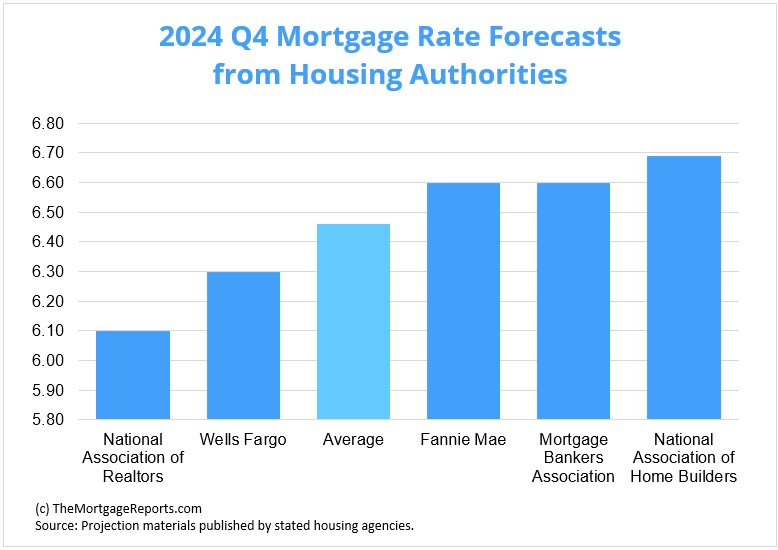Mortgage rate forecast for next week (Nov. 25-29)
After inching down last week, mortgage interest rates climbed again.
The average 30-year fixed rate mortgage (FRM) increased to 6.84% on Nov. 21 from 6.78% on Nov. 14, according to Freddie Mac.
“Heading into the holidays, purchase demand remains in the doldrums. While for-sale inventory is increasing modestly, the elevated interest rate environment has caused new construction to soften,” said Freddie Mac Chief Economist Sam Khater.
Find your lowest mortgage rate. Start hereIn this article (Skip to...)
- Will rates go down in December?
- 90-day forecast
- Expert rate predictions
- Mortgage rate trends
- Rates by loan type
- Mortgage strategies for December
- Mortgage rates FAQ
Will mortgage rates go down in December?
“Treasury yields have also climbed in response to market expectations of inflationary pressures tied to the incoming administration’s proposed policies, such as tariffs and tax cuts, even though these measures have yet to take effect, putting additional upward pressure on mortgage rates.”
-Sam Williamson, senior economist at First American
Mortgage rates fluctuated significantly in 2023, with the average 30-year fixed rate going as low as 6.09% and as high as 7.79%, according to Freddie Mac. That range narrowed in 2024, with a spread of 6.08% to 7.22%.
Find your lowest mortgage rate. Start hereWith the economy possibly heading into a recession, we may have already seen the peak of this rate cycle. But if inflation rises, mortgage rates could uptrend. Of course, interest rates are driven by many factors and notoriously volatile, so they could change direction any given week.
Experts from CoreLogic, Home Qualified, First American, Realtor.com, and CJ Patrick weigh in on whether 30-year mortgage rates will climb, fall, or level off in December.
Expert mortgage rate predictions for December

Molly Boesel, principal economist at CoreLogic
Prediction: Rates will moderate
“While the Federal Reserve once again cut the federal funds rate, longer-term interest rates had already adjusted for the cut and mortgage rates stayed in the high-6% range for most of November. There is little to suggest that mortgage rates will decrease by much in the coming weeks, therefore look for the 30-year mortgage rate to run in the high-6% range for the rest of the year.”

Ralph DiBugnara, president at Home Qualified
Prediction: Rates will decline
“Mortgage rates have spiked post-election mostly based around the unknown of a new administration and inflation numbers creeping back up. I believe to end the year we will see a decrease in home sales and consumer spending compared to previous years. This combined with a seasonal slow down may change investor and consumer sentiment which will ultimately lower rates slightly on average from November.”

Danielle Hale, chief economist at Realtor.com
Prediction: Rates will moderate
“Mortgage rates are going to be data dependent in December. Recent inflation data has surprised to the high side, and while October hiring was lackluster, extenuating circumstances from strikes to hurricanes likely impacted the numbers. An additional pickup in inflation or stronger labor market data is likely to push mortgage rates higher even if it doesn’t cause the Fed to forego another rate cut. On the flip side, more modest readings on inflation or the labor market could help soften longer-term rates, including for mortgages.”

Rick Sharga, CEO at CJ Patrick Company
Prediction: Rates will moderate
“It seems likely that rates on 30-year mortgage loans will end the year slightly higher than they were in December of 2023 when rates were at roughly 6.6%-6.7%. Inflated yields on the 10-year Treasury bonds are the culprit. Those yields rose due to unexpectedly strong economic reports recently, and will probably stay somewhat elevated due to concerns that some of the economic policies President-elect Trump advocated during the campaign may be inflationary, or add to the country’s already-record $35 trillion debt. Markets hate uncertainty, and that uncertainty will probably keep rates right around 7% for the balance of the year.”

Sam Williamson, senior economist at First American
Prediction: Rates will moderate
“Investors are split on the likelihood of another 25-basis point cut in December, following recent comments made by Federal Reserve Chair Jerome Powell suggesting that the central bank is not rushing to lower rates. This uncertainty poses upside risks on Treasury yields and, consequently, mortgage rates, in the near term. Treasury yields have also climbed in response to market expectations of inflationary pressures tied to the incoming administration’s proposed policies, such as tariffs and tax cuts, even though these measures have yet to take effect, putting additional upward pressure on mortgage rates.
“Mortgage rates are not expected to drift much lower in December than where they are today. However, rates could drop if data shows a sudden economic slowdown or labor market deterioration. Conversely, rates could rise further if the economy outperforms expectations or inflation comes in hotter than expected. Despite short-term headwinds putting upward pressure on mortgage rates, we still anticipate a downward trend toward in 2025 if the labor market continues to soften and inflation slows, despite some expected volatility along the way.”
Mortgage interest rates forecast next 90 days
As inflation ran rampant in 2022, the Federal Reserve took action to bring it down and that led to the average 30-year fixed-rate mortgage spiking in 2023.
With inflation gradually cooling, the Fed adjusted its policies with skipped hikes a cut in September and more expected going forward. Additionally, the economy showing signs of slowing has many experts believing mortgage interest rates will gradually descend in 2024.
Find your lowest mortgage rate. Start hereOf course, rates could rise on any given week or if another global event causes widespread uncertainty in the economy.

Mortgage rate predictions for 2024
The 30-year fixed-rate mortgage averaged 6.84% as of Nov. 21, according to Freddie Mac. All five major housing authorities we looked at project 2024’s fourth quarter average to finish below that.
National Association of Realtors sits at the low end of the group, predicting the average 30-year fixed interest rate to settle at 6.1% for Q4. Meanwhile, the National Association of Home Builders had the highest forecast of 6.69%.
| Housing Authority | 30-Year Mortgage Rate Forecast (Q4 2024) |
| National Association of Realtors | 6.1% |
| Wells Fargo | 6.3% |
| Fannie Mae | 6.6% |
| Mortgage Bankers Association | 6.6% |
| National Association of Home Builders | 6.69% |
| Average Prediction | 6.46% |

Current mortgage interest rate trends
Mortgage rates rose after ticking down last week.
The average 30-year fixed rate increased to 6.84% on Nov. 21 from 6.78% on Nov. 14. The average 15-year fixed mortgage rate similarly grew to 6.02% from 5.99%.
Get started shopping for mortgage rates| Month | Average 30-Year Fixed Rate |
| October 2023 | 7.62% |
| November 2023 | 7.44% |
| December 2023 | 6.82% |
| January 2024 | 6.64% |
| February 2024 | 6.78% |
| March 2024 | 6.82% |
| April 2024 | 6.99% |
| May 2024 | 7.06% |
| June 2024 | 6.92% |
| July 2024 | 6.85% |
| August 2024 | 6.50% |
| September 2024 | 6.18% |
| October 2024 | 6.43% |
Source: Freddie Mac
After hitting record-low territory in 2020 and 2021, mortgage rates climbed to a 23-year high in 2023. Many experts and industry authorities believe they will follow a downward trajectory into 2024. Whatever happens, interest rates are still below historical averages.
Dating back to April 1971, the fixed 30-year interest rate averaged around 7.8%, according to Freddie Mac. So if you haven’t locked a rate yet, don’t lose too much sleep over it. You can still get a good deal, historically speaking — especially if you’re a borrower with strong credit.
Just make sure you shop around to find the best lender and lowest rate for your unique situation.
Mortgage rate trends by loan type
Many mortgage shoppers don’t realize there are different types of rates in today’s mortgage market. But this knowledge can help home buyers and refinancing households find the best value for their situation.
Find your lowest mortgage rate. Start hereWhich mortgage loan is best?
The best mortgage for you depends on your financial situation and your goals.
For instance, if you want to buy a high-priced home and you have great credit, a jumbo loan is your best bet. Jumbo mortgages allow loan amounts above conforming loan limits, which max out at $ in most parts of the U.S.
On the other hand, if you’re a veteran or service member, a VA loan is almost always the right choice. VA loans are backed by the U.S. Department of Veterans Affairs. They provide ultra-low rates and never charge private mortgage insurance (PMI). But you need an eligible service history to qualify.
Conforming loans and FHA loans (those backed by the Federal Housing Administration) are great low-down-payment options.
Conforming loans allow as little as 3% down with FICO scores starting at 620. FHA loans are even more lenient about credit; home buyers can often qualify with a score of 580 or higher, and a less-than-perfect credit history might not disqualify you.
Finally, consider a USDA loan if you want to buy or refinance real estate in a rural area. USDA loans have below-market rates — similar to VA — and reduced mortgage insurance costs. The catch? You need to live in a ‘rural’ area and have moderate or low income to be USDA-eligible.
Mortgage rate strategies for December 2024
Mortgage rates displayed their famous volatility throughout 2024. Fed cuts in September and November, with the likelihood for more provide optimism for descending rates, but ongoing inflation battles keep them in check.
Find your lowest mortgage rate. Start herePreviously, the central bank held off on a rate hike at eight consecutive meetings, preferring to see if the economy would keep cooling organically. They finally deemed inflation’s downtrend as organic and made its first cuts since 2020. As always, the committee said it would adjust its policies as necessary — which could mean additional cuts or possibly none at all.
Here are just a few strategies to keep in mind if you’re mortgage shopping in the coming months.
Be ready to move quickly
Indecision can lead to failure or missed opportunities. That holds true in home buying as well.
Although the housing market is becoming more balanced than the recent past, it still favors sellers. Prospective borrowers should take the lessons learned from the last few years and apply them now even though conditions are less extreme.
“Taking too long to decide to make an offer can lead to paying more for the home at best and at worst to losing out on it entirely. Buyers should get pre-approved (not pre-qualified) for their mortgage, so that the seller has some certainty about the deal closing. And be ready to close quickly — a long escrow period will put you at a disadvantage.
And it’s definitely not a bad idea to work with a real estate agent who has access to “coming soon” properties, which can give a buyer a little bit of a head start competing for the limited number of homes available,” said Rick Sharga.
If mortgage rates continue on a downward trajectory, more and more buyers will likely enter the market after being priced out on the sidelines. Being decisive (and prepared) should only play to your advantage.
Shopping around isn’t only for the holidays
Since interest rates can vary drastically from day to day and from lender to lender, failing to shop around likely leads to money lost.
Lenders charge different rates for different levels of credit scores. And while there are ways to negotiate a lower mortgage rate, the easiest is to get multiple quotes from multiple lenders and leverage them against each other.
“For potential home buyers, it’s important to get quotes from multiple lenders for a mortgage, as rates can vary dramatically, especially during such a volatile period,” said Odeta Kushi.
As the mortgage market slows due to lessened demand, lenders will be more eager for business. While missing out on the rock-bottom rates of 2020 and 2021 may sting, there’s always a way to use the market to your advantage.
How to shop for interest rates
Rate shopping doesn’t just mean looking at the lowest rates advertised online because those aren’t available to everyone. Typically, those are offered to borrowers with great credit who can put a down payment of 20% or more.
The rate lenders actually offer depends on:
- Your credit score and credit history
- Your personal finances
- Your down payment (if buying a home)
- Your home equity (if refinancing)
- Your loan-to-value ratio (LTV)
- Your debt-to-income ratio (DTI)
To figure out what rate a lender can offer you based on those factors, you have to fill out a loan application. Lenders will check your credit and verify your income and debts, then give you a ‘real’ rate quote based on your financial situation.
You should get three to five of these quotes at a minimum, then compare them to find the best offer. Look for the lowest rate, but also pay attention to your annual percentage rate (APR), estimated closing costs, and ‘discount points’ — extra fees charged upfront to lower your rate.
This might sound like a lot of work. But you can shop for mortgage rates in under a day if you put your mind to it. And shaving just a few basis points off your rate can save you thousands.
Compare mortgage and refinance rates. Start here
Mortgage interest rate FAQ
Current mortgage rates are averaging 6.84% for a 30-year fixed-rate loan and 6.02% for a 15-year fixed-rate loan, according to Freddie Mac’s latest weekly rate survey. Your individual rate could be higher or lower than the average depending on your credit score, down payment, and the lender you choose to work with, among other factors.
Mortgage rates could decrease next week (November 25-29, 2024) if the mortgage market takes a cautious approach to a possible recession. However, rates could rise if lenders account for the Federal Reserve taking measures to counteract inflation or if a global event brings economic uncertainty.
If inflation continues to dissipate and the economy cools or goes into a recession, it’s likely mortgage rates will decrease in 2025. Although, it’s important to remember that interest rates are notoriously volatile and are driven by many factors, so they can rise during any given week.
Mortgage rates may rise in 2025. High inflation, strong demand in the housing market, and policy changes by the Federal Reserve in 2022 and 2023 all pushed rates higher. However, if the U.S. does indeed enter a recession, mortgage rates could come down.
Freddie Mac is now citing average 30-year rates in the 7% range. If you can find a rate in the 5s or 6s, you’re in a very good position. Remember that rates vary a lot by borrower. Those with perfect credit and large down payments may get below-average interest rates, while poor-credit borrowers and those with non-QM loans could see much higher rates. You’ll need to get pre-approved for a mortgage to know your exact rate.
For the most part, industry experts do not expect the housing market to crash in 2023. Yes, home prices are over-inflated. But many of the risk factors that led to the 2008 crash are not present in today’s market. Low inventory and massive buyer demand should keep the market propped up next year. Plus, mortgage lending practices are much safer than they used to be. That means there’s not a subprime mortgage crisis waiting in the wings.
At the time of this writing, the lowest 30-year mortgage rate ever was 2.65%. That’s according to Freddie Mac’s Primary Mortgage Market Survey, the most widely used benchmark for current mortgage interest rates.
Locking your rate is a personal decision. You should do what’s right for your situation rather than trying to time the market. If you’re buying a home, the right time to lock a rate is after you’ve secured a purchase agreement and shopped for your best mortgage deal. If you’re refinancing, you should make sure you compare offers from at least three to five lenders before locking a rate. That said, rates are rising. So the sooner you can lock in today’s market, the better.
That depends on your situation. It’s a good time to refinance if your current mortgage rate is above market rates and you could lower your monthly mortgage payment. It might also be good to refinance if you can switch from an adjustable-rate mortgage to a low fixed-rate mortgage; refinance to get rid of FHA mortgage insurance; or switch to a short-term 10- or 15-year mortgage to pay off your loan early.
It’s often worth refinancing for 1 percentage point, as this can yield significant savings on your mortgage payments and total interest payments. Just make sure your refinance savings justify your closing costs. You can use a mortgage calculator or speak with a loan officer to crunch the numbers.
Start by choosing a list of three to five mortgage lenders that you’re interested in. Look for lenders with low advertised rates, great customer service scores, and recommendations from friends, family, or a real estate agent. Then get pre-approved by those lenders to see what rates and fees they can offer you. Compare your offers (Loan Estimates) to find the best overall deal for the loan type you want.
What are today’s mortgage rates?
Mortgage rates are rising, but borrowers can almost always find a better deal by shopping around. Connect with a mortgage lender to find out exactly what rate you qualify for.
Time to make a move? Let us find the right mortgage for you1Today's mortgage rates are based on a daily survey of select lending partners of The Mortgage Reports. Interest rates shown here assume a credit score of 740. See our full loan assumptions here.
Selected sources:
- https://www.federalreserve.gov/monetarypolicy/fomccalendars.htm
- http://www.freddiemac.com/research/datasets/refinance-stats/index.page
